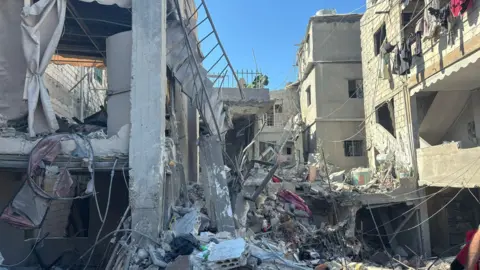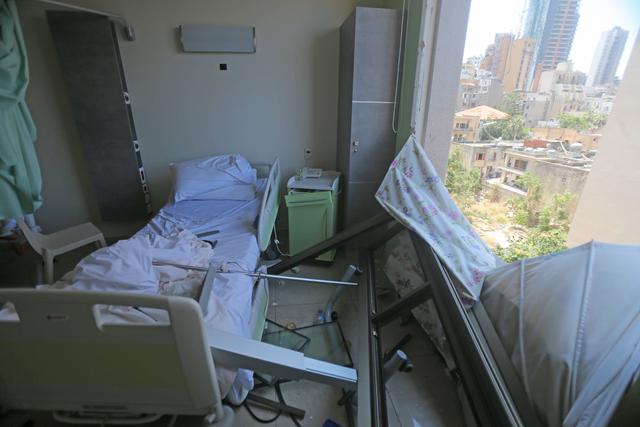Israeli Military Accuses Hezbollah of Stashing Millions in Cash and Gold Beneath Beirut Hospital Amid Escalating Conflict
Tensions between Israel and Hezbollah have escalated dramatically, with the Israeli military accusing the Lebanese militant group of storing vast amounts of cash and gold in a secret bunker located beneath a hospital in the southern suburbs of Beirut. The Israeli Defense Forces (IDF) claims that this hidden financial hub, uncovered following a targeted Israeli airstrike, is crucial to Hezbollah’s financing of its operations against Israel. According to Rear Admiral Daniel Hagari, the IDF believes that the bunker contains hundreds of millions of dollars in cash and gold, which have been instrumental in funding Hezbollah’s recent military activities.
O
 n Sunday night, the Israeli Air Force launched a series of precision strikes on what it described as Hezbollah’s financial strongholds. Hagari revealed that one of the key targets was an underground vault believed to be holding millions in assets. “The money was being used to finance Hezbollah’s attacks on Israel,” Hagari stated. The facility, according to Israeli intelligence, was designed to support extended stays and could still contain significant sums of cash and gold. The IDF’s revelations have sent shockwaves through Lebanon, but proof of the financial assets in question has yet to be provided.
n Sunday night, the Israeli Air Force launched a series of precision strikes on what it described as Hezbollah’s financial strongholds. Hagari revealed that one of the key targets was an underground vault believed to be holding millions in assets. “The money was being used to finance Hezbollah’s attacks on Israel,” Hagari stated. The facility, according to Israeli intelligence, was designed to support extended stays and could still contain significant sums of cash and gold. The IDF’s revelations have sent shockwaves through Lebanon, but proof of the financial assets in question has yet to be provided.
As part of its evidence, Israel released an animated graphic that purported to show the bunker’s location under the hospital, claiming that Hezbollah had used the same facility to hide its former secretary-general, Hassan Nasrallah. Nasrallah, who was reportedly killed in an Israeli airstrike last month, is said to have constructed the bunker for Hezbollah’s long-term use. However, the exact details of the bunker and its contents remain undisclosed, leaving room for speculation.

Despite these serious allegations, Lebanese officials have categorically denied the claims. Fadi Alameh, a Lebanese lawmaker from the Shi’ite Amal Movement party and the hospital’s director, rejected Israel’s accusations as false. In a statement to Reuters, Alameh called on the Lebanese Army to visit the hospital, which, according to him, houses only operating rooms, patients, and a morgue. He added that the hospital had been evacuated in light of the escalating tensions. Alameh’s response reflects the broader skepticism surrounding the Israeli claims, which Hezbollah has not yet officially commented on.
Israeli officials, however, continue to stand by their assertions. Hagari claimed that around $500 million in cash and gold were stored within the Hezbollah bunker. He insisted that this money could be used to rebuild the state of Lebanon but is instead being used to fund Hezbollah’s activities against Israel. The IDF’s focus on Hezbollah’s financial infrastructure signals a shift in strategy, targeting the group’s economic lifelines in addition to its military operations.
In his statement, Hagari made a direct appeal to Lebanese authorities and international organizations, urging them to prevent Hezbollah from using the money to finance terrorism. “There are hundreds of millions of dollars in cash and gold inside the bunker right now. I’m calling on the Lebanese government, Lebanese authorities, and the international organizations—don’t allow Hezbollah to use the money for terror and to attack Israel,” he said.
Despite these warnings, Hagari assured that the Israeli Air Force would not target the hospital itself, underscoring that the strikes are being carefully directed at Hezbollah’s financial networks rather than civilian infrastructure. This cautious approach is likely intended to avoid international condemnation for striking a hospital, a move that would undoubtedly escalate tensions even further.
The conflict between Israel and Hezbollah has been intensifying since October of last year, with both sides engaging in a cycle of retaliatory attacks. The latest wave of violence began after Israel launched a military offensive against Hamas in response to the deadly October 7 attacks. Hezbollah declared its solidarity with the Palestinian cause, and what started as a symbolic gesture has since evolved into regular exchanges of fire along the Lebanese-Israeli border.
In late September, Israel escalated its military operations against Hezbollah, signaling a “new phase” of the conflict. The Israeli government vowed to make northern Israel safe from Hezbollah’s strikes and expanded its military activities to include Hezbollah’s financial infrastructure. This shift has resulted in increased airstrikes targeting Hezbollah’s financial assets, which the IDF believes are crucial to sustaining the group’s military capabilities.
According to Israeli Chief of the General Staff Herzi Halevi, the overnight strikes between Sunday and Monday were part of an operation that hit 30 Hezbollah-owned sites. These sites, Israel claims, belong to Al-Qard al-Hassan, which it describes as Hezbollah’s financial arm. The strikes mark a significant development in the ongoing conflict, as Israel ramps up efforts to cripple Hezbollah’s financial and operational capacity.
The situation along the Israeli-Lebanese border remains tense, with both sides locked in an increasingly dangerous confrontation. The financial aspect of the conflict, now brought to the forefront by Israel’s latest accusations, adds a new layer of complexity to an already volatile situation. The IDF’s focus on Hezbollah’s alleged hidden wealth reflects a broader strategy to weaken the group not just through military means, but also by targeting its economic foundations.
Israel’s decision to expand its military operations against Hezbollah’s financial strongholds underscores the growing stakes in the conflict. With Hezbollah showing no signs of backing down and Israel determined to neutralize the threat posed by the militant group, the region appears to be teetering on the edge of a broader conflict. The international community, already concerned about the humanitarian consequences of the ongoing violence, will be closely monitoring how these developments unfold.
In the meantime, the Lebanese population finds itself caught in the crossfire of these escalating tensions. As Israel targets Hezbollah’s assets, the Lebanese economy, already struggling with a severe financial crisis, could face further instability. The accusations, denials, and military actions surrounding Hezbollah’s alleged financial networks will undoubtedly shape the next phase of the conflict, as both sides brace for what could be a prolonged and intensified confrontation.

